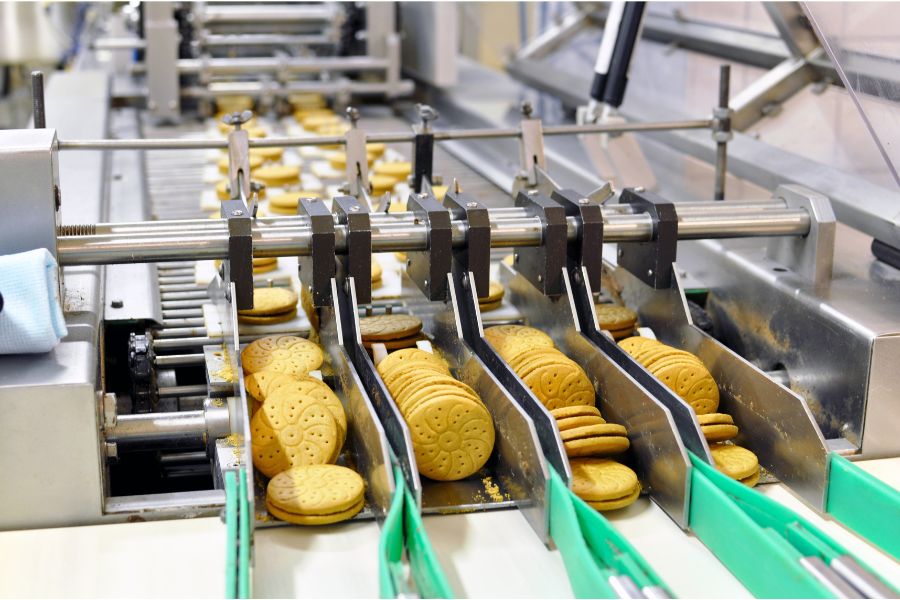The Best Industrial Dust Collectors to Combat Food Processing Dust
The Best Industrial Dust Collectors to Combat Food Processing Dust
Dec 14, 2024

The Best Industrial Dust Collectors to Combat Food Processing Dust
Dust management in the food processing industry is critical for maintaining workplace safety, meeting regulatory standards, and ensuring product quality. Flowmax Filtration India Industrial dust collectors play a pivotal role in addressing these challenges by effectively capturing and controlling food processing dust.
What Is Food Processing Dust?
Food processing dust consists of fine particles generated during manufacturing, including flour, sugar, spices, grain, and other food powders. These particles can become airborne during processes like mixing, grinding, packaging, and transporting.
This dust poses unique risks:
Health Risks: Dust inhalation can cause respiratory issues for workers.
Combustibility: Many food powders are combustible, leading to explosion hazards.
Equipment Damage: Dust can accumulate in machinery, reducing efficiency and increasing maintenance costs.
How Dust Collectors Work
Dust collectors capture airborne particles using a combination of filtration and separation techniques. Key components of Flowmax Filtration India, dust collector manufacturer from Coimbatore, include:
Inlets: Direct dust-laden air into the system.
Filters: Capture fine particles while allowing clean air to exit.
Fans/Blowers: Provide airflow to transport dust.
Hoppers: Collect and store captured dust for disposal.
Types of Dust Collectors for Food Processing
Baghouse Dust Collectors:
Ideal for fine and sticky dust.
Features fabric bags that trap particles.
Cartridge Dust Collectors:
Compact and efficient.
Suitable for light to moderate dust loads.
Cyclone Dust Collectors:
Pre-separate heavy particles.
Commonly paired with other systems.
Wet Scrubbers:
Use water or mist to trap dust.
Effective for combustible dust but require water disposal.
Electrostatic Precipitators:
Employ electrical charges to capture dust.
Best for very fine particulates.
Factors to Consider When Choosing a Dust Collector
Dust Type: Flour and sugar require different filtration capabilities than spices.
Facility Layout: Space constraints may necessitate compact systems.
Airflow Requirements: Calculating cubic feet per minute (CFM) for your facility ensures optimal performance.
Compliance Needs: Look for systems certified for OSHA and NFPA standards.
Top Features to Look for in Dust Collectors
HEPA Filters: Ensure maximum particle capture efficiency.
Explosion-Proof Designs: Critical for handling combustible dust.
Modular Systems: Allow for scalability as your processing needs grow.
Automatic Filter Cleaning: Reduces maintenance downtime.
The Best Industrial Dust Collectors to Combat Food Processing Dust
Dust management in the food processing industry is critical for maintaining workplace safety, meeting regulatory standards, and ensuring product quality. Flowmax Filtration India Industrial dust collectors play a pivotal role in addressing these challenges by effectively capturing and controlling food processing dust.
What Is Food Processing Dust?
Food processing dust consists of fine particles generated during manufacturing, including flour, sugar, spices, grain, and other food powders. These particles can become airborne during processes like mixing, grinding, packaging, and transporting.
This dust poses unique risks:
Health Risks: Dust inhalation can cause respiratory issues for workers.
Combustibility: Many food powders are combustible, leading to explosion hazards.
Equipment Damage: Dust can accumulate in machinery, reducing efficiency and increasing maintenance costs.
How Dust Collectors Work
Dust collectors capture airborne particles using a combination of filtration and separation techniques. Key components of Flowmax Filtration India, dust collector manufacturer from Coimbatore, include:
Inlets: Direct dust-laden air into the system.
Filters: Capture fine particles while allowing clean air to exit.
Fans/Blowers: Provide airflow to transport dust.
Hoppers: Collect and store captured dust for disposal.
Types of Dust Collectors for Food Processing
Baghouse Dust Collectors:
Ideal for fine and sticky dust.
Features fabric bags that trap particles.
Cartridge Dust Collectors:
Compact and efficient.
Suitable for light to moderate dust loads.
Cyclone Dust Collectors:
Pre-separate heavy particles.
Commonly paired with other systems.
Wet Scrubbers:
Use water or mist to trap dust.
Effective for combustible dust but require water disposal.
Electrostatic Precipitators:
Employ electrical charges to capture dust.
Best for very fine particulates.
Factors to Consider When Choosing a Dust Collector
Dust Type: Flour and sugar require different filtration capabilities than spices.
Facility Layout: Space constraints may necessitate compact systems.
Airflow Requirements: Calculating cubic feet per minute (CFM) for your facility ensures optimal performance.
Compliance Needs: Look for systems certified for OSHA and NFPA standards.
Top Features to Look for in Dust Collectors
HEPA Filters: Ensure maximum particle capture efficiency.
Explosion-Proof Designs: Critical for handling combustible dust.
Modular Systems: Allow for scalability as your processing needs grow.
Automatic Filter Cleaning: Reduces maintenance downtime.